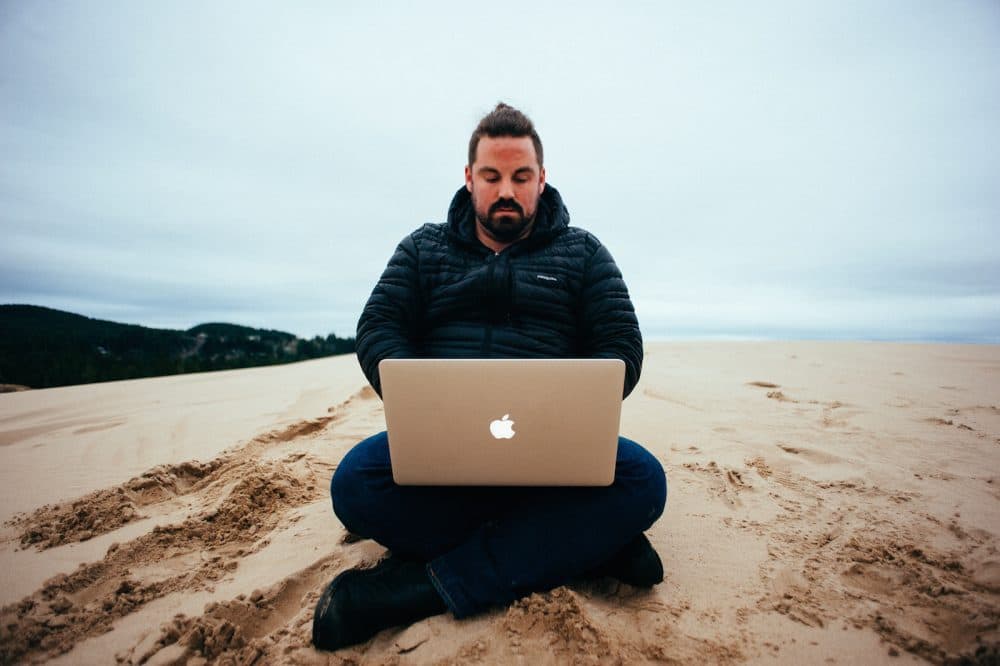Advertisement
Millionaire By Age 30? One Blogger Offers A Few Not-So-Easy Steps

Grant Sabatier was a college graduate, living with his parents, too broke to buy a burrito, when he decided that he was going to make $1 million by age 30. He says the first thing he needed to do was change his mindset to one of saving — which he refers to as "paying yourself first."
He's now a successful blogger and digital strategist who offers six steps to wealth, which include side jobs, stock market investment, lifestyle changes and daily saving goals.
Sabatier (@sabatier), vice president of digital strategy at Eduvantis and founder of the Millennial Money blog, joins Here & Now's Robin Young to discuss his strategies for financial independence, and the potential pitfalls.
"The biggest takeaway is, you know, a lot of people think money's a lot more complicated than it actually is," Sabatier says. "And if you just start paying yourself first, and view saving as opportunity as opposed to a sacrifice, and you just keep putting it away, you know, you're gonna wake up in five, 10 or 15 years with a lot more money than you realized you would ever be able to have."
So You Want To Be A Millionaire ... By The Time You're 30?
"It actually ended up being a pretty stressful thing to do."
Where Do You Start?
"I had learned a little bit at that time about compounding interest, and so one of the biggest assets that I realized I had was just time. The value of saving when you're young is significantly more valuable than saving really at any time in your life. So I started to make that mindset shift where I wanted to make as much money as possible really so I could invest it."
Diversifying Your Income: A 'Side-Hustle'
"In my quest to really invest as much money as possible, I did the simple math, and, you know, if you're making $30,000, $40,000, $50,000 a year and you're saving 5 to 10 percent of your income, it's pretty hard to save enough and invest enough money to even retire in the next 30, 35 years.
So, one of the biggest things is, when you look at the most successful people or the most successful and wealthiest people in world, they really have two things in common. A lot of them are entrepreneurs, and a lot of them have multiple income streams. And so even me, with my $50,000-a-year job, I knew that I needed to diversify my income streams, and then invest as much money as I could from those extra income streams.
"I tend to prefer and recommend side-hustles that you're using to build skills. If you invest in your skills, if you learn to code — even if you walk dogs in your neighborhood, and you build that skill and you build a client base, and then you turn it into a small business, and then all of the sudden you've got multiple income streams and a business as opposed to just a simple side-hustle."
Advertisement
Saving Your Income ...
"If you save $5 a day and just invest it in a simple Vanguard Total Stock Market Index Fund, and you get between 5 and 7 percent annually on that $5 a day that you're depositing, you'll have about $177,000 in 30 years. And that's just $5 a day.
"And what I figured out is, for me personally, I determined that I needed $1,250,000 to retire, which is essentially 25 times my expected annual expenses of $50,000 per year. And I figured that in order to get there I needed to save $50 a day for the next 30 years.
"And so, when I shifted my mindset and started thinking about it on a day-to-day basis, then every dollar that I could save over that $50, I was gonna be able to retire earlier."
... And Not Falling Victim To 'Lifestyle Inflation'
"I share a lot of the mistakes I make very openly on the blog, and one of the biggest ones was just lifestyle inflation. The calculation is built around me being able to spend about $50,000 per year for the rest of my life. And so if I go considerably over that, I'm gonna have to make more money and invest it. The thing is, once I reached financial independence, I didn't stop working. I'm still making quite a bit of money, and so I have some more flexibility there. But, I quickly realized last year that I was spending a lot more money than I'd ever spent, and that, you know, I really had to rein it in and get it under control."
This article was originally published on April 25, 2017.
This segment aired on April 25, 2017.